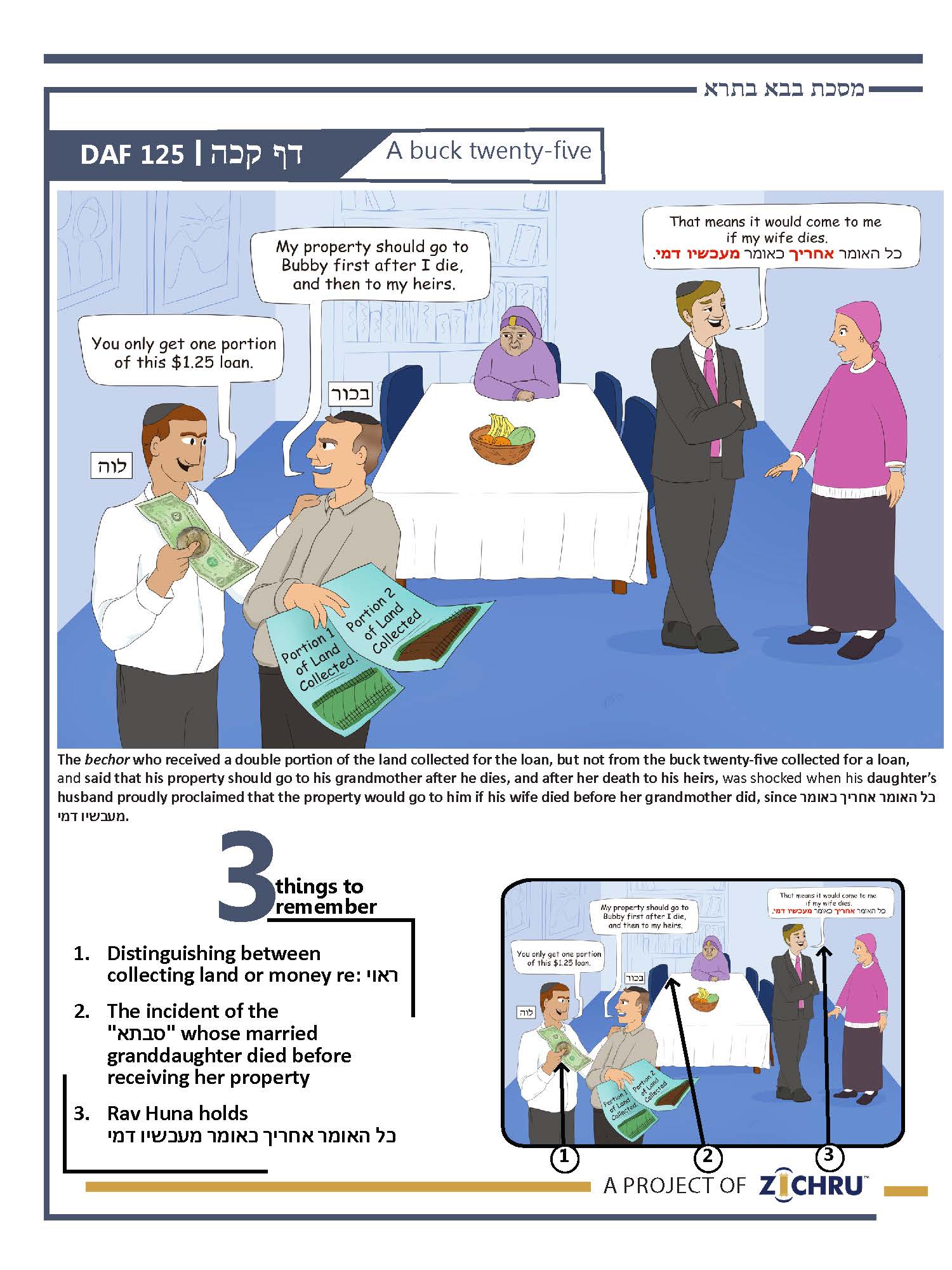Bava Basra - Daf 125
- Audio Timestamps
0:00 - The 3 Sugyos
3:02 - Review of 3 Sugyos
5:52- Siman
9:05 - 4 Blatt Back Chazarah
14:42 - Pop Quiz (Last 7 blatt)
For access to all Zichru resources including PDFs, and illustrations CLICK HERE
- Distinguishing between collecting land or money re: ראוי
The previous Daf discussed whether a bechor receives a double portion of loan payments. Rabbah said it depends on what was collected: גבו קרקע יש לו – if they collected land for the loan, [the bechor] does have a double portion in it. גבו מעות אין לו – But if they collected money, he does not have a double portion in it. Since the land was משועבד to the loan, it is considered מוחזק – already possessed, as opposed to money. Rav Nachman says the opposite: if money was collected, the bechor has a double portion, because it is also money which was originally borrowed. If they collect land, he does not, since land was not lent, and is a new possession. Abaye asked Rabbah that both views are difficult. The distinction is difficult in either direction, because for the same reason that one item is not considered מוחזק (namely, that the father did not leave behind this land or money when he died), the other item should also not be considered מוחזק!? Abaye posed two more challenges, presenting contradictions in Rabbah’s and Rav Nachman’s own opinions regarding these distinctions. Rabbah responds that both he and Rav Nachman were merely explaining the opinion of the בני מערבא, who held a bechor receives double in a loan payment, but they themselves hold he never does.
- The incident of the "סבתא" whose married granddaughter died before receiving her property
A man once said: נכסי לסבתא ובתרה לירתאי – “My property should go to my grandmother after I die, and after her death, it should go to my heirs.” This man had a married daughter who died before her grandmother, and after the grandmother died, the daughter’s husband came to claim the property. Rav Huna said that when the man said the property should go "לירתי" – to my heirs, it means אפילו לירתי ירתי – even to the heirs of my heirs, and the husband (who inherits his wife) is entitled to the property. Rav Anan disagreed, and said the phrase "לירתי" does not include the heirs of his heirs. Since no direct heirs were alive when the grandmother died, the grandmother’s heirs inherit the property. They sent from Eretz Yisroel that the halachah is like Rav Anan, but for an entirely different reason. Rav Anan would hold no heirs of the daughter could claim the property (such as a son of the daughter), which is not so. Only the husband cannot claim the property, because it is ראוי – potential assets (since the daughter died before inheriting them), and a husband does not inherit ראוי.
- Rav Huna holds כל האומר אחריך כאומר מעכשיו דמי, but the בני מערבא disagree
The Gemara asks if Rav Huna holds that a husband does inherit ראוי. Why does he say the husband receives the property after the grandmother’s death, if his wife never possessed it during her lifetime? Rebbe Elazar explained Rav Huna’s reasoning: כל האומר אחריך – Anyone who gives a gift saying “after you it should go to someone else,” כאומר מעכשיו דמי – is like saying the second recipient acquires the gift from now. The first recipient (here, the grandmother) owns only the land’s produce, while the second recipient (here, the daughter) owns the land itself. Therefore, the husband can inherit the land from his wife, who did own it during her lifetime. Rabbah says the opinion of the "בני מערבא" – Westerners (from Eretz Yisroel) is more reasonable. The halachah is (on Daf 137a) that if the grandmother had sold the property during her lifetime, the sale would have been valid, and the daughter would receive nothing. This proves she exclusively owned it during her lifetime, and the daughter never possessed it.
Siman – A buck twenty-five
The bechor who received a double portion of the land collected for the loan, but not from the buck twenty-five collected for a loan and said that his property should go to his grandmother after he dies, and after her death to his heirs, was shocked when his daughter’s husband proudly proclaimed that the property would go to him if his wife died before her grandmother did, since כל האומר אחריך כאומר מעכשיו דמי.


